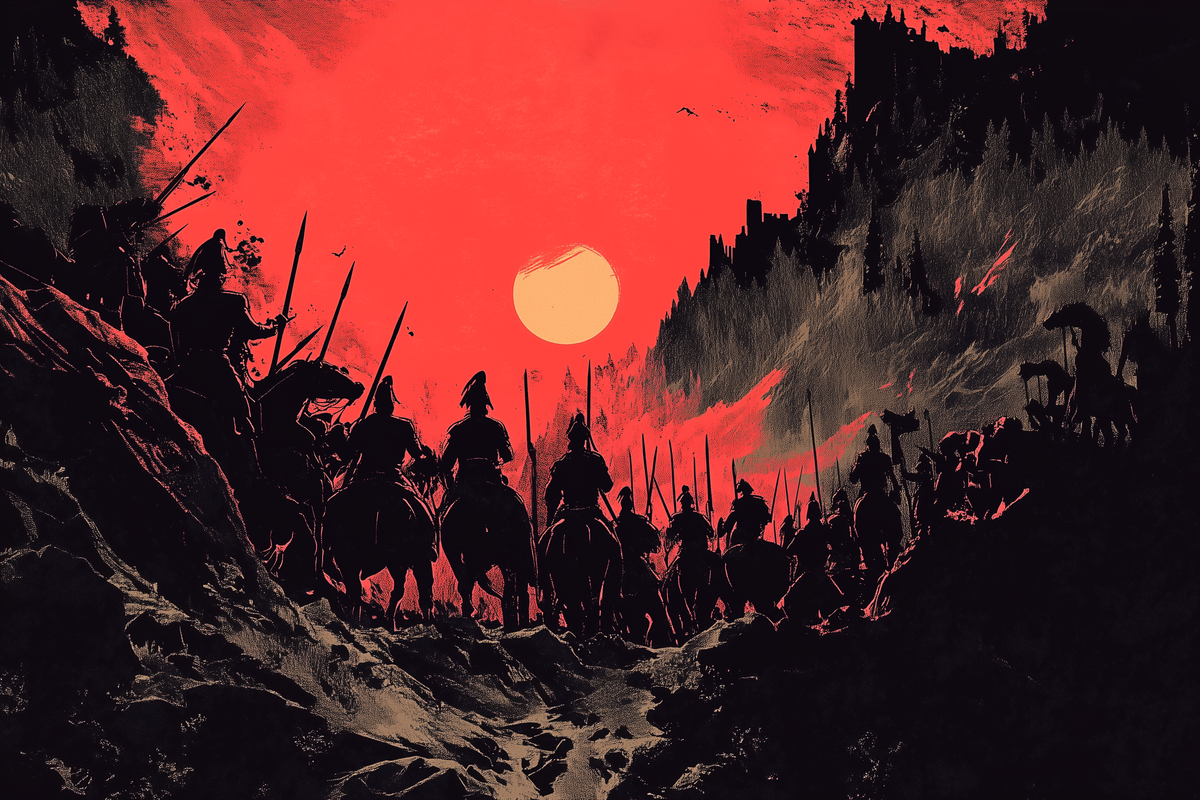The Great Battle of Karánsebes

They march through Karánsebes like gods who've forgotten they're mortal. September 1788. The Habsburg war machine. Eighty thousand souls in white and gold, stretched across the Banat plain. The Austrian Empire's finest. The inheritors of Charlemagne, Marcus Aurelius, and Christ himself. If you believe the regimental priests.
Colonel Baranski sits his stallion. A Lipizzaner from the Emperor's own stock. White as bone, trained in Vienna's Spanish Riding School. The horse knows sixty-seven movements. Baranski knows three: forward, stop, and pose for portraits. He sits like a man practicing for currency. Every muscle arranged. Every angle calculated. History will remember him. He's sure of it.
Behind him: the 37th Hussars. Hungarian nobility playing soldier. Their dolmans cost more than infantry yearly pay. Braided cord. Silver buttons. Peacock feathers in their shakos. They smell like pomade and last night's wine. They've killed exactly nothing.
"Let the Turks come," Baranski tells his men. Voice: gravel poured over metal. "We'll eat them alive. We'll make their bones our trophies."
The words hang in the air. Expensive. Empty. Like the medals on his chest. Twelve of them. For battles he watched through field glasses.
This is what victory sounds like before it happens.
Behind them: infantry. The real army.
Twenty thousand Austrians who speak German. Fifteen thousand Hungarians who don't. Ten thousand Romanians who speak Romanian and profit. Eight thousand Croats who speak Croatian and violence. Six thousand Italians from Lombardy who know three German words: Laden. Feuer. Sterben. Load. Fire. Die. The rest: Serbs, Slovaks, Poles, Czechs. A Habsburg fever dream.
Lieutenant Hummel walks with the 14th Infantry. Common stock. His father sold leather in Graz. Made boots for men who could afford horses. Now the son wears boots that leak. Counts steps. Three thousand since morning. Thinks of Vienna. Not the Vienna of palace balls and Mozart. The other Vienna. Smoke-filled taverns off Graben. Whores who charge by the quarter hour. A girl named Anna who laughs at his jokes. Her arms: soft. Her laugh: real. Something bright in a dark room.
They told him war would be noble. Das Vaterland braucht dich. The Fatherland needs you.
He looks at the men. Faces carved from disappointment. Eyes that have stopped believing in anything except the next meal, the next rest, the next chance to not die.
"You think the Turks will actually show up?" Fischer says. Missing tooth. Scar from Novi to jaw. Twenty-three years old. Looks forty.
"The day Turks come to Karánsebes, Fischer," Hummel says, "is the day you grow back that tooth."
Fischer grins. The gap black as a musket bore.
Above them, Baranski wheels his horse. The Lipizzaner executes a perfect levade. Front legs pawing air. Magnificent. Useless. Baranski points to himself. "You see that? That's what a real man looks like."
Someone in the ranks coughs. Quiet. Deliberate. "Real man's never met his own mud-soaked boots."
A Croat laughs. Doesn't understand the German. Laughs anyway. Laughter needs no translation.
The column stretches. A mile of babel. Officers shout orders in German. NCOs translate into Hungarian. Hungarian gets translated into Croatian. Croatian into Romanian. By the time orders reach the Italians, "advance in formation" becomes "march until someone shoots you."
This is what empire looks like: a game of telephone where the prize is death.
Sun drops toward the Carpathians. Shadows stretch like accusations. The valley opens before them. Empty. Green. Worthless. Exactly the kind of place empires die for.
Baranski raises a gloved hand. Halt. The gesture ripples back through ranks. Becomes six different gestures in six different languages. Half the army stops. Half keeps walking. A accordion compression of flesh and metal.
He sniffs the air. Theatre. Pure theatre. Like he can smell Ottoman steel across two hundred miles. In his mind: Janissaries. Elite troops. Curved kilij swords. They're waiting. Watching. Trembling at the mention of his name.
In reality: a shepherd on a distant hill. Three goats. A dog that barks once, bored.
"Think of it," Baranski says to his aide-de-camp. Young Baron von Steuben. Nineteen. Soft hands. Softer chin. Never used anything sharper than a letter opener. "Tonight, we'll have a feast. Ottoman heads on pikes."
He grins. All teeth. No soul.
The baron nods. Writes something in his journal. Probably poetry. About glory. About Austria. About Baranski's perfect jaw.
Hummel watches from below. Mutters: "More likely schnapps in a mug, but a man can dream."
Baranski's head turns. Slow. Mechanical. Like something in a clock tower. "Something you want to share, Lieutenant?"
"Just marveling at the plan, sir. Invading an empty valley. Tactical genius."
The words hang between them. Heavy. Dangerous. Around them, men pretend not to listen in fourteen languages.
Baranski's jaw works. You can hear the cartilage. "Genius, Lieutenant, is knowing when to strike."
"And when is that, sir?"
"When the enemy least expects it."
Hummel looks at the empty valley. The nothing. The absence. "They certainly won't expect us to attack nothing, sir."
Someone laughs. Stops. Laughs again. Can't help it.
Baranski's hand moves to his saber. French steel. Inherited. Never drawn in anger. Only in mirrors. "Careful, Lieutenant. Wars are won by believers."
"And lost by them too, sir."
A crow lands on a dead tree. Watches them. Black eye unblinking. It knows something they don't. Or maybe it knows exactly what they know but won't admit.
Baranski wheels his horse. The Lipizzaner executes a perfect pirouette. "We make camp at the river. Tomorrow, glory."
The word echoes wrong. Like a bell cracked.
They march on. Eighty thousand men. Speaking in tongues. Following a man who follows a dream of a man he thinks he should be.
Behind them: dust.
Ahead: the Timiș River. Silver in dying light.
